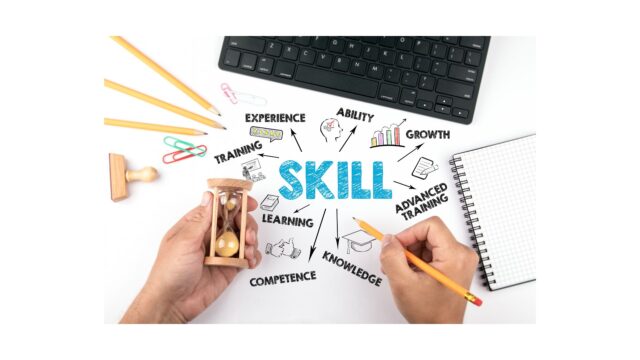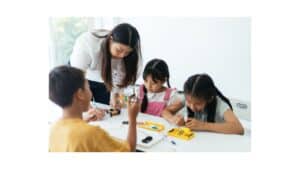In a world driven by connections, social skills play a pivotal role in personal and professional success. From effective communication to building meaningful relationships, mastering these skills can open doors to endless opportunities. Whether you’re an introvert or an extrovert, honing your social prowess can transform your life. Let’s delve into the intricacies of social skills and uncover their significance.
Understanding Social Skills
Social skills encompass a broad range of abilities that enable individuals to interact effectively and harmoniously with others in various social settings. These skills include verbal communication, which involves expressing thoughts and ideas clearly and articulately, as well as non-verbal communication, such as body language and facial expressions, which convey messages without words. Additionally, social skills entail empathy, the capacity to understand and share the feelings of others, which fosters deeper connections and mutual understanding.

Furthermore, active listening is a crucial aspect of social skills, allowing individuals to fully engage with speakers and comprehend their messages. By demonstrating genuine interest through attentive listening and providing appropriate feedback, one can enhance communication and strengthen relationships. Conflict resolution is another vital component of social skills, involving the ability to navigate disagreements and find mutually beneficial solutions. Overall, understanding the multifaceted nature of social skills is essential for effectively navigating social interactions and fostering positive relationships.
The Importance of Social Skills
Social skills are indispensable for success in both personal and professional spheres, serving as the foundation for effective communication, collaboration, and relationship-building. In personal relationships, strong social skills facilitate meaningful connections and mutual support, leading to greater happiness and fulfillment. In professional settings, social skills are equally essential, as they enable individuals to work effectively in teams, lead with empathy and authority, and navigate complex social dynamics.
Moreover, social skills are closely linked to emotional intelligence, which involves recognizing and managing one’s own emotions as well as understanding the emotions of others. This emotional awareness enhances decision-making, conflict resolution, and overall interpersonal effectiveness. Additionally, individuals with strong social skills are better equipped to handle stress and adapt to changing social environments. In today’s interconnected world, where networking and collaboration are paramount, the importance of social skills cannot be overstated. By prioritizing the development of these skills, individuals can unlock doors to success and cultivate fulfilling relationships both personally and professionally.
Developing Effective Communication
Effective communication is the cornerstone of successful social interaction, encompassing both verbal and non-verbal forms of expression. Verbal communication involves not only the words we use but also the tone, pitch, and pace of our speech, which convey additional layers of meaning. Moreover, effective communicators pay close attention to non-verbal cues, such as body language and facial expressions, which can significantly impact the message being conveyed. By honing their communication skills, individuals can express themselves more clearly and confidently, fostering better understanding and connection with others.
Furthermore, effective communication is essential for building rapport and resolving conflicts in both personal and professional relationships. By expressing oneself assertively yet respectfully, individuals can assert their needs and boundaries while also considering the perspectives of others. Additionally, mastering the art of active listening is crucial for effective communication, as it demonstrates genuine interest and empathy towards the speaker. Through active listening, individuals can fully engage with conversations, understand others’ viewpoints, and strengthen interpersonal connections.
Building Empathy and Emotional Intelligence
Empathy is the ability to understand and share the feelings of others, which is fundamental to fostering meaningful relationships and cultivating empathy. Emotional intelligence, on the other hand, involves recognizing and managing one’s own emotions as well as understanding the emotions of others. By developing empathy and emotional intelligence, individuals can enhance their interpersonal effectiveness and navigate social interactions with greater ease.

Moreover, empathy and emotional intelligence play a vital role in conflict resolution, as they enable individuals to approach disagreements with understanding and compassion. By acknowledging and validating the emotions of all parties involved, individuals can foster a collaborative atmosphere conducive to finding mutually satisfactory solutions. Additionally, empathy promotes inclusivity and diversity by encouraging individuals to consider perspectives different from their own, leading to more harmonious and equitable relationships. Overall, building empathy and emotional intelligence is essential for cultivating strong social skills and fostering positive connections with others.
Cultivating Active Listening Skills
Active listening is a fundamental component of effective communication, requiring individuals to fully engage with the speaker and comprehend their message. This involves not only hearing the words being spoken but also paying attention to non-verbal cues, such as facial expressions and body language, which provide additional context. By giving undivided attention to the speaker and refraining from interrupting or formulating responses prematurely, individuals can demonstrate respect and genuine interest in the conversation.
Furthermore, active listening involves providing feedback to the speaker to ensure mutual understanding and clarity. This may include paraphrasing or summarizing the speaker’s points to confirm comprehension and reflect empathy. Additionally, asking open-ended questions encourages further exploration of the topic and demonstrates curiosity and engagement. Through cultivating active listening skills, individuals can enhance their ability to connect with others, build rapport, and foster more meaningful relationships in both personal and professional contexts.
Navigating Social Dynamics
Social interactions often involve navigating complex dynamics and understanding unspoken cues, requiring individuals to be observant and adaptable. This includes interpreting body language, tone of voice, and social hierarchies to gauge the underlying dynamics of a situation. By being attuned to these subtle cues, individuals can adjust their behavior accordingly and navigate social situations with greater ease.
Moreover, understanding social dynamics is essential for building rapport and establishing trust in relationships. By recognizing power dynamics and social norms, individuals can interact with sensitivity and respect, avoiding inadvertently causing offense or discomfort. Additionally, being aware of group dynamics enables individuals to contribute effectively to team efforts and collaborate harmoniously with others. Overall, navigating social dynamics requires a combination of observation, empathy, and adaptability, allowing individuals to navigate diverse social environments with confidence and finesse.
Mastering Conflict Resolution
Conflict resolution is a critical skill for maintaining healthy relationships and fostering productive interactions. It involves addressing disagreements or disputes in a constructive manner, with the goal of reaching a mutually acceptable resolution. Effective conflict resolution requires active listening, empathy, and open-mindedness to understand the perspectives of all parties involved. By remaining calm and composed, individuals can create a safe space for dialogue and collaboration, fostering trust and respect among participants.
Furthermore, mastering conflict resolution involves identifying underlying issues and addressing them directly, rather than resorting to blame or deflection. This requires individuals to communicate assertively yet respectfully, expressing their concerns while also acknowledging the validity of others’ viewpoints. Additionally, finding common ground and seeking win-win solutions promotes cooperation and strengthens relationships in the long run. By mastering the art of conflict resolution, individuals can navigate conflicts with confidence and grace, fostering healthier and more harmonious relationships in all areas of life.
Overcoming Social Anxiety
Social anxiety can be a significant barrier to effective social interaction, causing individuals to feel self-conscious and apprehensive in social settings. However, overcoming social anxiety is possible with time, patience, and practice. Gradual exposure to social situations, starting with small and manageable steps, can help individuals build confidence and reduce anxiety over time.
Moreover, practicing relaxation techniques, such as deep breathing and mindfulness, can help alleviate physical symptoms of anxiety and promote a sense of calmness and control. Additionally, reframing negative thoughts and beliefs about social situations can empower individuals to approach them with a more positive and realistic mindset. Seeking support from friends, family, or a therapist can also provide valuable guidance and encouragement throughout the process of overcoming social anxiety. With persistence and determination, individuals can gradually overcome social anxiety and develop the social skills needed to thrive in various social settings.
Conclusion
Understanding the significance of social skills is vital for individuals striving for personal and professional success. Human interaction is at the core of our existence, and mastering effective communication, empathy, and social dynamics can profoundly impact our relationships and opportunities. By honing these skills, individuals can cultivate deeper connections, navigate conflicts, and collaborate more effectively with others.
At Positive Solutions Behavior Group LLC in Beavercreek, the importance of social skills in every aspect of life is recognized. Through comprehensive behavioral services, individuals are empowered to develop and refine their social skills, unlocking their full potential for success. Whether through tailored therapy sessions, group workshops, or community outreach initiatives, the aim is to provide the necessary support and resources for individuals to thrive socially and achieve their aspirations. Together, let’s embark on a journey of growth and transformation, leveraging the power of social skills to create a brighter and more fulfilling future for all.






